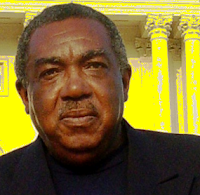Kick off Black History Month With a Healthy Dose of Humanities From Around DC and Beyond!
Like most scholars, I was skeptical about Wikipedia when Jimmy Wales first launched the site back in 2001. The notion that unvetted volunteers cooperatively contributing to an online encyclopedia might produce a reference work of any real value seemed at best dubious—and, more likely, laughably absurd. Surely it would be riddled with errors. Surely its coverage would be ridiculously patchy. Surely it would lack the breadth, depth, and nuance of more traditional reference works like the venerable Encyclopedia Britannica.
To some, Anacostia can also include a cluster of surrounding neighborhoods, including Fairlawn to the northeast and Barry Farm -- sometimes called Barry Farms -- to the southwest. To others, Anacostia is just, well, Anacostia, the neighborhood with the big chair.
Known as the “Father of Black History,” Woodson (1875-1950) was the son of former slaves, and understood how important gaining a proper education is when striving to secure and make the most out of one’s divine right of freedom. Although he did not begin his formal education until he was 20 years old, his dedication to study enabled him to earn a high school diploma in West Virginia and bachelor and master’s degrees from th University of Chicago in just a few years. In 1912, Woodson became the second African American to earn a PhD at Harvard University.
To start the workshop off with a shared understanding of the DPLA[Digital Public Library of America] initiative, Maura Marx, Director of the DPLA Secretariat, gave a brief presentation covering the events and ideas informing the development of the DPLA. The project was born from a relatively straightfoward need: to digitize materials, both historical and current, and make them widely available to the public. In 2010, The Alfred P. Sloan Foundation promised to offer funding to any group that could work toward that goal, and the DPLA arose shortly thereafter as a sort of "network operation center" to articulate and plan such a project.
On the second night of the Slam!, the poets of Beers Elementary School put on an impassioned performance with lines such as "We'll eliminate all distractions and change our ashes"; "Go to school, you can still be cool"; and "We can all make change for the better."
Dr. Ira Berlin, author and professor of history at the University of Maryland, will discuss the connections between slavery and the building of the university.
 |
| Col. Benjamin O. Davis, Jr. |
In reality, the Tuskegee Airmen placed a premium on discipline, precision, order and military bearing. After all, they were under the command of Benjamin O. Davis Jr., a black man from the District, whose rank as an Air Force general and whose education — 35th out of 276 at West Point, class of 1936 — was awe inspiring.
As a middle or high school student you have had plenty of experiences to shape your ideas and perspectives about cultural and global issues in our city, from your travels, or where you come from. Wouldn’t it be great if other students could learn what you know? With One World Education’s Culture & Global Issues Writing Program you have a chance to become a published writer – whose writing will be read by thousands of other students.




